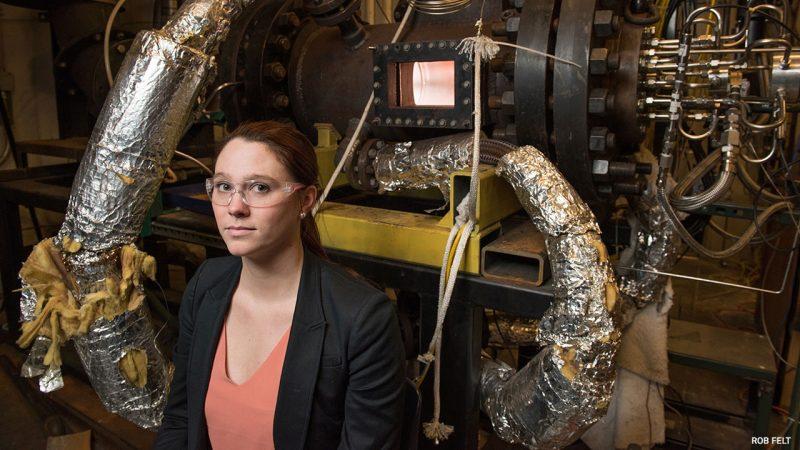AE's Julia Lundrigan Lights a Fire Under Combustion Research

Julia Lundrigan is a third-year graduate student in Georgia Tech’s School of Aerospace Engineering (AE). She studies how flames behave in aircraft and power generation engines at Georgia Tech’s Ben T. Zinn Combustion Lab, where engineers use the latest tools for the study of combustion and fluid mechanics. As an undergraduate, she helped launch a career fair for AE students. Today, she still plays a role in attracting companies to campus.
WHERE ARE YOU FROM?
I’m originally from Cincinnati, Ohio, but I came to Georgia Tech for my undergraduate degree. I graduated from AE with my bachelor’s degree in 2012.
WHAT DREW YOU TO AEROSPACE ENGINEERING?
Complex mechanical systems have always been interesting to me, so going to work on big aircraft engines seemed really cool. I switched my major to mechanical engineering so that I could apply to co-ops, then I started co-oping at Rolls Royce in my sophomore year.
HOW WAS YOUR EXPERIENCE WITH THE CO-OP PROGRAM?
In my first semester in the Rolls Royce lab, I was doing aerodynamic rig testing on components for aircraft engines. By the second semester, I was working on the F-136 engine assembly instrumentation and test team. I got to see one of the engines on the test stand, which was pretty amazing.
WHAT DO YOU STUDY NOW?
We study how flames behave. If you’re flying at high altitude where it’s really cold, then one of the worst things that can happen is you lose the flame in your combustor; it’s difficult to relight at high altitude. Also, when the flame goes out or is unstable, it can damage a lot of hardware, which is a really expensive problem. We want to make sure that the flame is on its best behavior.
On a fun level, we make fire and take pictures of it. We have really powerful lasers that we get to play with and use for diagnostics.
HOW DID YOU LAUNCH THE AE CAREER FAIR?
Up until my junior year, every major except AE had a career fair. I was an officer in Sigma Gamma Tau, the AE honor society, and we reached out to companies to come to campus. We had nine companies and a couple hundred students participate in our first year.
The career fair has grown every year since then. Many companies, such as Delta, United Technologies, GE, Honeywell, and BorgWarner, come every year. I’m still involved, and this past year was our biggest, with 12 companies and over 300 students.